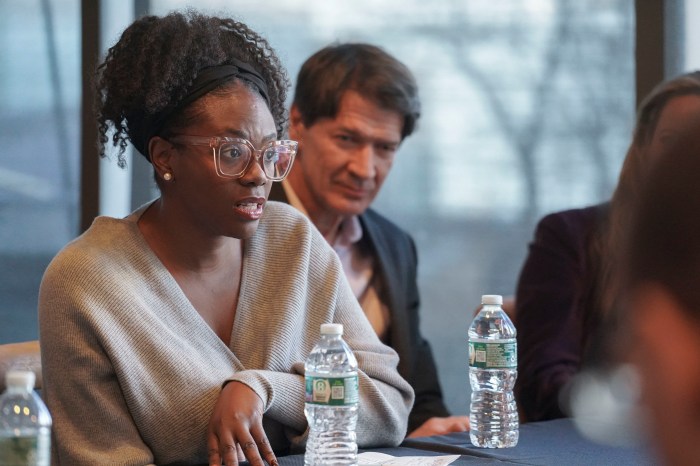By Albert Amateau
The City Planning Commission’s Sept. 23 hearing on the Hudson Yards project, involving the New York Sports and Convention Center stadium, the extension of the No. 7 subway line and the transformation of the West Side from 29th to 43rd Sts. into a high-rise office and residential district, attracted about 500 partisans pro and con.
True to the pattern set in previous hearings, hotel and construction trades union members cheered for the stadium and the rest of the city-sponsored project, saying “Build it now,” while Chelsea and Clinton neighbors shouted “no” to the stadium and demanded lower-scale office development and a mandate for permanent affordable housing.
Manhattan Borough President C. Virginia Fields, in response to questions from City Planning Commission chairperson Amanda Burden, spoke in favor of the Hell’s Kitchen Hudson Yards Association’s alternative to the comprehensive city plan.
“Our proposal does not call for a stadium on the West Side,” Fields said. “We’re calling for residential development on the site now proposed for a stadium.”
West Side residents, who felt that Fields had previously been too noncommittal on the stadium issue, wildly cheered her stand at the Sept. 13 hearing. Fields drew more cheers when she criticized the city plan for having no mandated requirement for permanent affordable housing.
The stadium, to cost $800 million funded by the New York Jets, would be located on a platform over the rail yards between 11th and 12th Aves., to be built for $600 million from the city and the state.
A small section of the rail yards platform would also provide space for city Department of Sanitation Trucks that now park on the Gansevoort Peninsula and for the city auto tow pound now located on Pier 76 at W. 35th St.
The Hell’s Kitchen Hudson Yards Association and the owner of Madison Sq. Garden filed a lawsuit on Aug. 26 to stop the Hudson Yards project land-use review, including the Sept. 23 hearing in the Haft Auditorium at Fashion Institute of Technology.
Filed in State Supreme Court, the lawsuit contends that the 4,000-plus-page draft environmental impact statement for the 42-block West Side project from 29th to 43rd Sts. between Ninth Ave. and the Hudson River is “incomplete and fatally deficient.”
But State Supreme Court Justice Herman Cahn ruled on Sept. 21 that the review and the hearing could continue, saying that the review procedure would provide opportunities for challenges to the draft E.I.S. in the next few months.
A Chelsea woman who had spent a year and a half in a city homeless shelter in the East Village, testified at the Sept. 23 hearing for a requirement for permanent affordable housing in the Hudson Yards project.
“I had money in the bank and I thought I was immune to problems that befall the less fortunate. Then I had a health problem, my money ran out and I could not afford an apartment,” recalled Carol Demech.
In the East Village shelter with her were a lawyer who had a major illness and lost everything, a former nurse, a former teacher and two people who at one time had thriving businesses, she said. “We were not the type of people you’d expect to find homeless,” she said. “But there we were.”




































